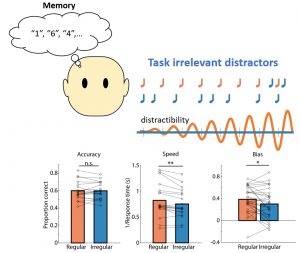A ticking clock in the living room; an ambient music in the café; the footsteps of a passersby on the street – We are surrounded by a plethora of distracting events with regular temporal structures in daily life. Can we ignore these distractors better?
Troby Ka-Yan Lui and Malte Wöstmann recently published a study on the effect of temporally regular versus irregular distractors on the ability to maintain items in memory. Surprisingly, they found that the temporal regularity of distractors did not have an effect on participant’s memory performance. Instead, they found an effect of the temporal regularity of distractors on response behaviour – participants were faster and more biased in responding whether the current number matched with the number in memory.
These results have theoretical implications: external distraction may have a more pervasive influence on different aspects of cognitive processes than memory maintenance. The article will soon be available in Scientific Reports.
